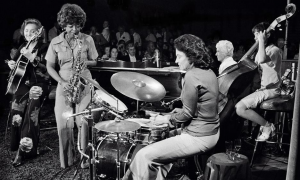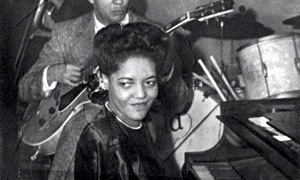Home » Jazz Articles » Charts of Elegance » The Timeless Voice Of Billie Holiday
The Timeless Voice Of Billie Holiday

By her own account, she was a vocalist who needed a personal connection to the songs she sang. Perhaps that emotional quality is what made her style so compelling. The songs she sang mirrored the circumstances of her life, and as such she was able to bring them to life in such a way that the audience was also living them as well.
One of the most distinctive features of her style was the fluctuations of pitch she used to create contrast elements in her phrasing, similar to what a musician does with a physical instrument. These inflections interrupted the melody flow in such a way as to create small bursts of emotion, which served to keep the audience hanging on each word she sang. Songs that showcase her distinctive fluctuation are: "Gloomy Sunday" and "Solitude."
Her articulation relied heavily on open ended vowel sounds, which allowed for more softened and elongated phrasing. She also took great care in the syllable by syllable pronunciation of the lyrics. In order to achieve the emphasis on syllable articulation, her vocal resonance was more shallow and focused in her head. Her intentional articulation allowed for a lingering of each lyric and consequently a deeper impact of the meaning of those words in the song.
She had a unique style in the stretching of words and phrases to create swing combined with off-beat timing that resulted in unique arrangements. Some songs that highlight this quality are: "Billie's Blues" and "I gotta Right to Sing the Blues."
Holiday was one of the first well known performers to cover a song that highlighted racism in America—"Strange Fruit." In this song, she kept the tempo slow and the accompaniment sparse. The lyrics evoke vivid images of southern racial violence, while she also mixed in staccato elements which increased the potency of certain words. The style with which she sang this song, in combination with its content, created a lasting and haunting impression. Performing in the era of Jim Crow laws, Holiday experienced extreme racism which made touring difficult. The response to her performance of this song further complicated those difficulties. The song was timely in content but it was not received well due to its painful nature. There was resistance from her record company to even record the song, though she did eventually succeed in getting the song recorded. Shortly after performing "Strange Fruit," Holiday was targeted for investigation by the Federal Bureau of Narcotics in conjunction with her growing substance abuse and dependency. This inquest would ultimately lead to the end her live performance opportunities and would follow her to her untimely death at age 44. The head of the narcotics bureau is thought to have had racial biases that motivated his targeted investigations in the jazz world, including the investigation of Holiday. Throughout these hardships, she refused to stop singing the song and speaking out against racism, a testament to her courage and commitment to the unflinching truth telling which defined her musical career.
Her perseverance in the face of difficulties and dedication to finding her own voice to speak the truth made Billie Holiday a quintessential jazz musician. She left behind a revered body of work that continues to be celebrated for its originality and social significance.
< Previous
Thomas Strønen: Sense of Time
Next >
Zero
Comments
Tags
For the Love of Jazz
 All About Jazz has been a pillar of jazz since 1995, championing it as an art form and, more importantly, supporting the musicians who create it. Our enduring commitment has made "AAJ" one of the most culturally important websites of its kind, read by hundreds of thousands of fans, musicians and industry figures every month.
All About Jazz has been a pillar of jazz since 1995, championing it as an art form and, more importantly, supporting the musicians who create it. Our enduring commitment has made "AAJ" one of the most culturally important websites of its kind, read by hundreds of thousands of fans, musicians and industry figures every month.























